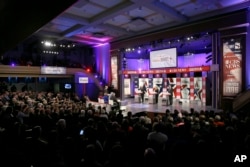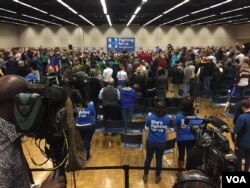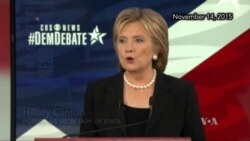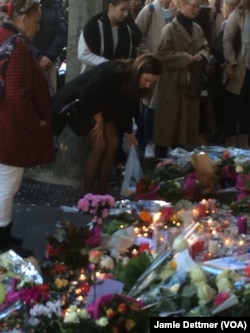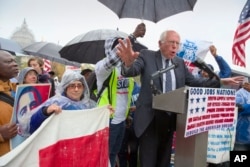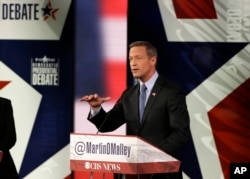U.S. Democratic presidential contenders promised a more aggressive fight against the Islamic State group, but offered few specifics on how they would do so, as they faced off in their party's second debate of the primary election campaign.
The debate, held Saturday in the early presidential nominating state of Iowa, focused largely on national security and foreign policy, coming a day after the deadly terrorist attacks in Paris, France.
The forum began with a moment of silence for the 129 people killed and hundreds wounded in the Paris gun and bomb attacks, which have been claimed by the Islamic State group.
Early in the debate, former Secretary of State Hillary Clinton vowed to crush the Islamic State, saying it "cannot be contained, it must be defeated."
The comments were seen by some as an implicit criticism of President Barack Obama, who insisted this week the extremist group has been "contained" and was not gaining in strength.
Foreign policy experience
From the outset, Clinton cast herself as the most experienced foreign policy candidate on stage.
"This election is not only about electing a president. It’s also about choosing our next commander in chief," she said. "Our country deserves no rest because all of the other issues we want to deal with depends on us being secure and strong."
Vermont Senator Bernie Sanders, whose campaign has focused more on domestic than foreign policy, used slightly more hawkish than usual language to describe his strategy to deal with the Islamic State.
Sanders said he was "shocked and disgusted" by the Paris attacks, and vowed the U.S. would lead the global effort to "rid our planet of this marvelous organization called ISIS."
As he has repeatedly done during his presidential run, Sanders also criticized Clinton for her 2002 congressional vote in support of the U.S. invasion of Iraq:
"I would argue that the disastrous invasion of Iraq, something I strongly opposed, has unraveled the region completely and led to the rise of al-Qaida and to ISIS," Sanders said, using an alternate name for the Islamic State.
Former Maryland Governor Martin O'Malley, who is lagging far behind Clinton and Sanders in opinion polls, said the Paris attacks represent "the new face of conflict of warfare in the 21st century."
"And there is no nation on the planet better able to adapt to this change than our nation. We must be able to work collaboratively with others. We must anticipate these threats before they happen," O'Malley said.
Middle East refugees
All three candidates said the U.S. should do more to help refugees fleeing violence in the Middle East, provided they are sufficiently screened for security risks.
The Obama administration is making plans to accept 10,000 Syrian refugees in fiscal year 2016, a significant increase over the 2,000 accepted in the previous year.
WATCH: Democratic presidential candidates discuss Paris attacks
O'Malley said the U.S. has the moral responsibility to do more. "I was the first person on this stage to say we should accept 65,000 refugees," he said. "And I believe that needs to be done with proper screening.
"There are other ways to lead and to be a moral leader in this world than at the opposite end of a drone strike," O'Malley added.
While Clinton stressed the "No. 1 requirement" is that the U.S. is kept safe, she also expressed support for accepting 65,000 Syrian refugees, provided there is an extensive "screening and vetting process."
Attacks shift focus
The candidates spent much of the first half of the debate discussing foreign policy issues, in a possible reflection of how the Paris attacks are reshaping the 2016 presidential race.
"There will be more of a focus on national security and foreign policy," said Alex Ward, the associate director of the Brent Scowcroft Center on International Security at the Washington-based Atlantic Council.
The shift in emphasis will likely benefit Clinton, who, because of her time as America's top diplomat, has the most extensive foreign policy experience of any candidate in either party, according to Ward.
But while all of the candidates are feeling pressure to come out with tough anti-Islamic State statements, none on Saturday offered substantive new information about how they would combat the group, he said.
"They all went a bit further than they did in the past, but didn't go too deep into how they would see their ends met," Ward said.
Economic issues
The candidates also focused on several non-foreign policy issues, including the economy.
Sanders defended his plan to raise the federal minimum hourly wage from its current level, at $7.25, to $15, saying: "It is not a radical idea to say that someone who works 40 hours a week should not be living in poverty."
The independent senator, who caucuses with the Democratic Party, refers to himself as a "democratic socialist," and has constantly spoken of the need to reduce the growing inequality gap.
Clinton, meanwhile, said she supports raising the minimum wage to $12, adding that individual states could choose to go higher than that.
In one of the more notable exchanges of the night, Clinton and Sanders clashed over how best to regulate Wall Street (U.S. economic powers). The senator said Clinton's plan was "not good enough," and said she could not be trusted, in part because she accepts campaign funds from corporate donors.
Clinton shot back, accusing Sanders of "impugning my integrity." She said her plan is more comprehensive than Sanders', because it will "go after all of Wall Street, not just the big banks."
Polls
The debate comes as opinion polls show Clinton extending her lead over Sanders, who has provided what many see as an unexpected challenge.
Clinton has nearly a 22-point lead over Sanders, according to an average of national polls compiled by RealClearPolitics, with Clinton garnering nearly 55 percent, compared to Sanders' 33 percent. O'Malley came in at nearly 3 percent.






